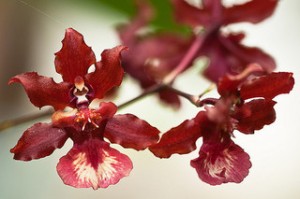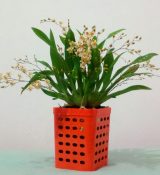Deciphering the Code: Orchid Names Made Easy
Author: Melanie Dearringer1 Comment

Orchid names can certainly be overwhelming. With their seemingly foreign composition, it is easy to see why many people refer to orchids by their common name. While there is no harm in this, learning your orchid’s scientific name will not only allow you better communicate with orchid professionals, it can also reveal a great deal about your plant. An orchid’s name is surprisingly easy to decipher once you understand its basic composition.
Let’s use the following orchid as an example.
Oncidium Sharry Baby ‘Sweet Fragrance’ AM/AOS
Genus
The first name, Oncidium, refers to the genus the orchid belongs to. The orchid family consists of hundreds of genera (plural form of genus) and many can be further bred to create even more genera. The genus name is in Latin, the international language of science, and will be capitalized and in italics. You may come across an orchid that has been bred with an orchid of another genus. Often times, the two genus names are simply combined to create a hybrid-generic name, such as Doritaenopsis (Doritis and Phalaenopsis). For simplicity, many horticulturalists will use shortened versions of the genus name. For example, Phalaenopsis is simply shortened to Phal.
Species
Each genus is then further divided by variations. To acknowledge these variations, a descriptor name is assigned. The descriptor name, written in lower case italics, is located directly after the genus name. This, coupled with the genus, identifies the orchid’s species. An orchid’s species will generally reveal some subtle piece of information about the plant such as the person that made the discovery, its place of origin, a notable characteristic, etc. A great example of this is Paphiopedilum philippinense, an orchid that was first discovered in the Philippines.
Hybrid
When two species are bred, or crossed, they produce a man-made hybrid. In this case, a grex will be assigned to the offspring. Like the descriptor name above, the grex is also located immediately after the genus name. So how do you know if your orchid is a naturally occurring species or man-made hybrid? Unlike naturally occurring species, all words in a grex should begin with a capital letter. They are never italicized and aren’t written in Latin. Oncidium Sharry Baby ‘Sweet Fragrance’ AM/AOS. We noted that this particular orchid is from the Oncidium genus. Now we can identify it as the hybrid, Sharry Baby.
Oncidium Sharry Baby ‘Sweet Fragrance’ AM/AOS. We noted that this particular orchid is from the Oncidium genus. Now we can identify it as the hybrid, Sharry Baby.
Note: When a hybrid is made for the first time, the breeder can register it with the International Orchid Registrar. This usually isn’t completed until either the breeder desires to breed the hybrid further or enter it into competitions. In this case, the hybrid is simply listed by its parents, female first.
Cultivar
Not all orchids will be given a cultivar name. Cultivar names are typically reserved for orchids, both species and hybrids, that are believed to be of award quality and will be entered into competition. These names are always capitalized and are noted in single quotations. In our example: Oncidium Sharry Baby ‘Sweet Fragrance’ AM/AOS, the cultivar name is ‘Sweet Fragrance’ which describes its mouthwatering chocolate aroma.
Awards and Associations
Sometimes you will find extra letter following your orchid’s name. These letters signify that your orchid is an award winner. The letters prior to the slash, AM in our example, indicate the type of award. While the letters following the slash, AOS (American Orchid Society), indicate the association that administered the award.
Common awards are abbreviated as follows:
- FCC: First Class Certificate
- AM: Award of Merit
- HCC: Highly Commended Certificate
Sources
Oncidium photo credit: Chantal Wagner Kornin via http://www.flickr.com/photos/nanjenchan/5072003861/
Featured image photo credit: -Reji via http://www.flickr.com/photos/rejik/13564459804/
One response on “Deciphering the Code: Orchid Names Made Easy”
Leave a Reply


Ask an Expert
Questions about orchids?
Our experts love a challenge!
Photo of the Week
Submit your photo to be featured on the blog!
More Photo of the Week Winners
Submit Photo








Very interesting thank you. I have trouble with the latin names .